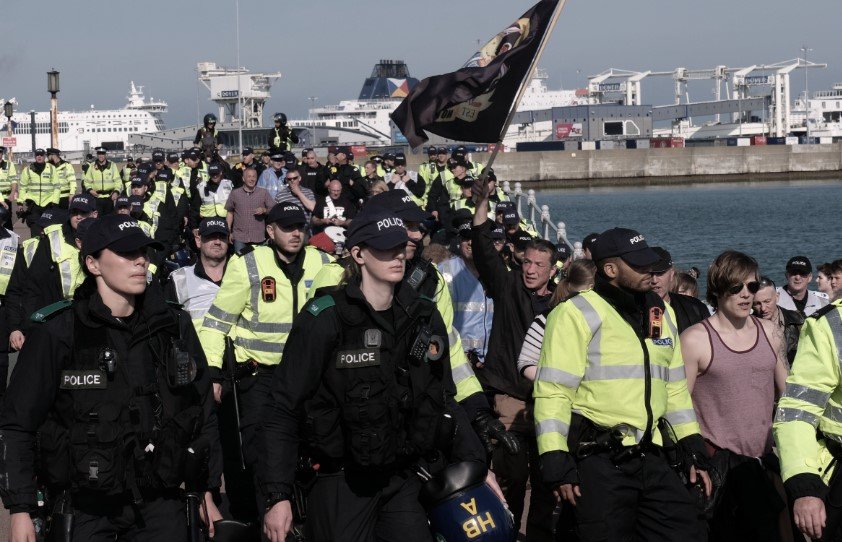Saudi authorities have arrested over 17,000 people in a major nationwide crackdown on residency, labor, and border law violations. This operation, led by the Ministry of Interior and the General Directorate of Passports, took place over the past month and aims to enforce strict immigration rules while protecting the job market and national security.
Crackdown Details and Timeline
The sweep began as part of ongoing efforts to tackle illegal residency and unauthorized work in Saudi Arabia. Officials targeted individuals with expired permits, those working without proper papers, and people crossing borders illegally.
In recent weeks, the pace has picked up. Just last week, authorities reported nearly 22,000 arrests in a single seven-day period. This follows similar actions earlier in August, where thousands faced detention for related offenses.
The initiative reflects the kingdom’s push to regulate its large expatriate workforce. With millions of foreign workers in the country, these laws help ensure fair employment and reduce illegal activities.
Types of Violations and Arrest Numbers
Violators included a mix of residency breaches, border security issues, and labor law problems. Many came from neighboring countries like Yemen and Ethiopia, often entering without permission.
Here are the main violation categories from the latest reports:
- Residency law breaches: Over 13,000 cases, involving expired or fake permits.
- Border security violations: Around 5,000 incidents, mostly illegal crossings.
- Labor law offenses: About 4,000, including working without sponsorship.
These numbers show a focused effort across all regions, from major cities like Riyadh and Makkah to border areas.

In one recent week, the breakdown looked like this:
| Violation Type | Number of Arrests | Percentage of Total |
|---|---|---|
| Residency | 13,551 | 61% |
| Border | 4,665 | 21% |
| Labor | 4,006 | 18% |
This table highlights how residency issues dominate the crackdown.
Authorities also deported over 12,900 people during the same period, sending them back to their home countries after processing.
Officials note that many arrests happen during routine inspections at workplaces, roads, and checkpoints.
Penalties for Violators and Helpers
Those caught face tough punishments to deter future breaches. Fines can reach up to 50,000 Saudi riyals, with possible jail time depending on the offense.
For serious cases, like repeated violations, deportation is common, along with bans on re-entry for years.
The rules also target anyone helping violators. Saudi citizens or residents who provide shelter, jobs, or transport could get up to 15 years in prison and fines of 1 million riyals.
Vehicles or properties used in these acts may be seized. This strict approach aims to cut off support networks for illegal residents.
In recent months, over 100,000 administrative decisions have penalized offenders, including imprisonment and deportations.
How Citizens Can Report Violations
The Ministry of Interior encourages people to report suspicious activities without fear of backlash. This helps keep the system effective and protects legal workers.
Reports can go through emergency hotlines. In places like Riyadh and Makkah, dial 911. For other areas, use 999 or 996.
Informants stay anonymous, and the process is quick. This public involvement has led to many successful arrests.
Broader Impact on Saudi Society
This crackdown ties into Saudi Arabia’s Vision 2030 goals, which focus on creating jobs for citizens and streamlining the economy.
By removing illegal workers, the kingdom opens opportunities for locals in sectors like construction and services.
However, it also raises concerns for migrant communities. Human rights groups call for fair treatment during arrests and deportations.
Similar efforts in neighboring countries, like the UAE’s recent amnesty and raids, show a regional trend toward tighter immigration controls.
In 2025, these actions have deported tens of thousands across the Gulf, affecting families and businesses.
The operations also boost border security amid ongoing regional tensions.
Experts say these measures help reduce crime linked to illegal residency, such as fraud and smuggling.
Future Outlook and Ongoing Efforts
Authorities plan to continue inspections to maintain order. Weekly reports will track progress and highlight any shifts in violation patterns.
This comes as Saudi Arabia hosts major events, like religious pilgrimages, where strict rules prevent unauthorized access.
Recent data from August shows a spike in arrests, with over 21,000 in another week, signaling no slowdown.
The kingdom urges all residents to check their papers and comply with laws to avoid trouble.
What do you think about these crackdown efforts? Share your views in the comments below and spread the word by sharing this article with others who might find it useful.
